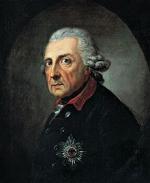Disable ads!
Frederick the Great
Frederick II Portrait of King Frederick II by Anton Graff, painted in 1781 King of Prussia Elector of Brandenburg Reign 31 May 1740 – 17 August 1786 Predecessor Frederick William I Successor Frederick William II Chief Minister List Heinrich von Podewils Georg Dietlof von Arnim-Boitzenburg Count Karl-Wilhelm Finck von Finckenstein Friedrich Anton von Heinitz Spouse Elisabeth Christine of Brunswick-Bevern House House of Hohenzollern Father Frederick William I of Prussia Mother Sophia Dorothea of Hanover Born (1712-01-24)24 January 1712 Berlin, Prussia Died 17 August 1786(1786-08-17) (aged 74) Potsdam, Prussia Burial Sanssouci, Potsdam Religion Officially Calvinist, privately deist Frederick II (German: Friedrich; 24 January 1712 – 17 August 1786) was the third Hohenzollern king, reigning over the Kingdom of Prussia from 1740 until 1786. Frederick's achievements during his reign included his military victories, his reorganization of Prussian armies, his patronage of the Arts and the Enlightenment in Prussia, and his final success against great odds in the Seven Years' War. He became known as Frederick the Great (Friedrich der Große) and was nicknamed Der Alte Fritz ("Old Fritz") by the Prussian people. In his youth, Frederick was more interested in music and philosophy than the art of war. He defied his authoritarian father, Frederick William I, and sought to run away with his best friend Hans Hermann von Katte. They were caught at the border and King Frederick William I nearly executed his son for desertion. After being pardoned, he was forced to watch the official beheading of Hans. Upon ascending to the Prussian throne, he attacked Austria and claimed Silesia during the Silesian Wars, winning military acclaim for himself and Prussia. Near the end of his life, Frederick physically connected most of his realm by conquering Polish territories in the First Partition of Poland. He was an influential military theorist whose analysis emerged from his extensive personal battlefield experience and covered issues of strategy, tactics, mobility and logistics. Frederick was a proponent of enlightened absolutism. He modernized the Prussian bureaucracy and civil service and pursued religious policies throughout his realm that ranged from tolerance to oppression. He reformed the judicial system and made it possible for men not of noble stock to become judges and senior bureaucrats. Some critics however point out his oppressive measures against conquered Polish subjects. Frederick supported arts and philosophers he favored, but at the same enacted several laws censoring the press. Frederick is buried at his favorite residence, Sanssouci in Potsdam. Because he died childless, Frederick was succeeded by his nephew, Frederick William II, son of his brother, Augustus William. Nearly all 19th century German historians made Frederick into a romantic model of a glorified warrior, praising his leadership, administrative efficiency, devotion to duty and success in building up Prussia to a leading role in Europe. Historian Leopold von Ranke was unstinting in his praise of Frederick's "Heroic life, inspired by great ideas, filled with feats of arms...immortalized by the raising of the Prussian state to the rank of a power." Johann Gustav Droysen was even more extolling. Frederick remained an admired historical figure through the German Empire's crushing defeat in First World War, and the Nazis glorified him as a great German leader pre-figuring Hitler, but his reputation became far less favorable in 1945 in both East and West Germany after the fall of the Nazi regime.
 Read more on wikipedia.org Read more on wikipedia.org
 All quotes by Frederick the Great All quotes by Frederick the Great
 Edit Edit
|

|
|
|
|
|
Background photo by Giuliana
|